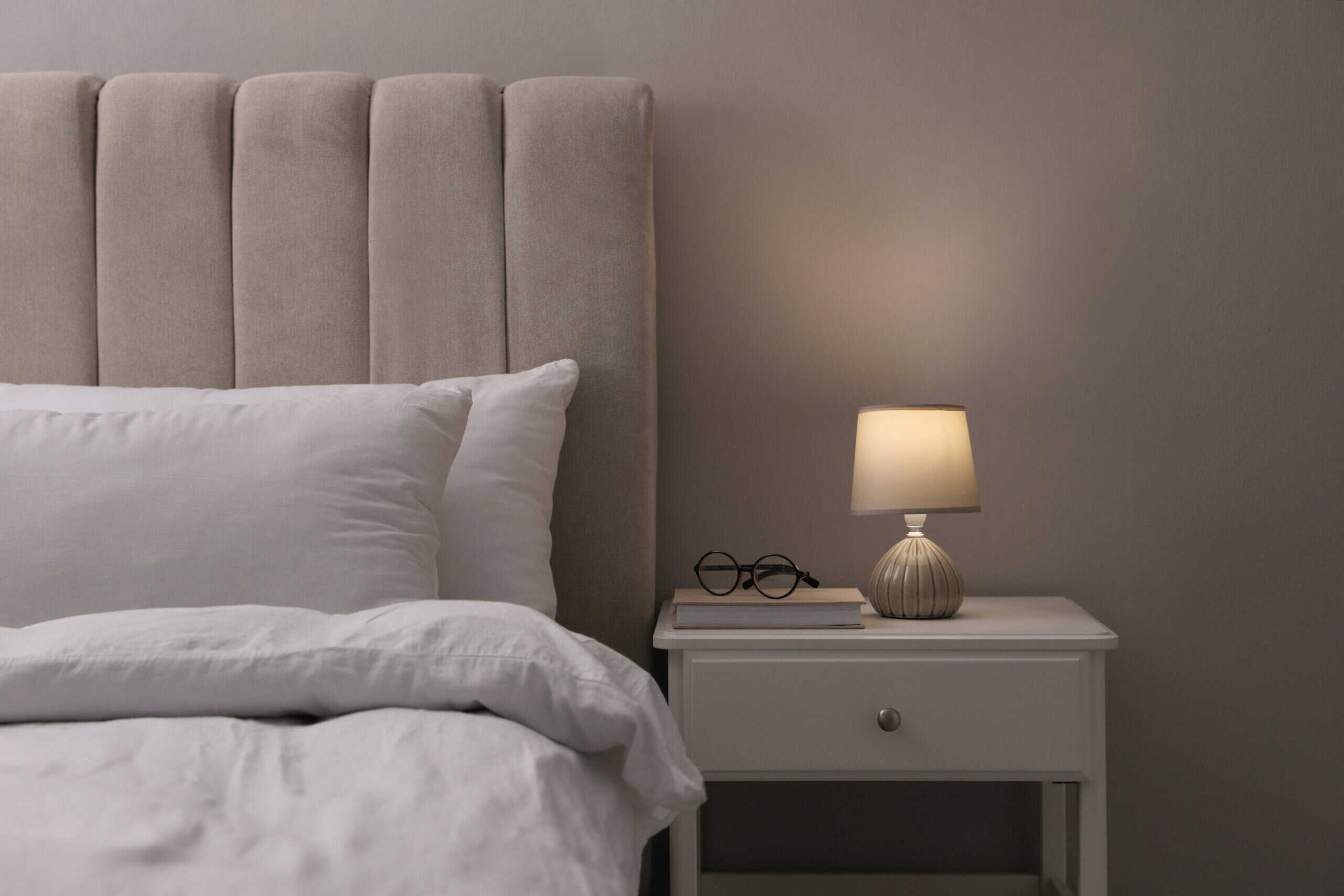How to improve sleep during menopause
If you’re in the throes of menopause, you’ll likely already be familiar with the usual symptoms of hot flashes, mood swings and brain fog, but you may have found that your sleep is also affected. As many as 60% of menopausal women experience sleep difficulties, which can then exacerbate other symptoms.1 The good news is there is something you can do to improve your rest: menopause and sleep can be improved by first addressing your diet.
Read on to find out more about menopause and sleep, why there’s a relationship between the two, and our top tips for improving your sleep and losing weight during menopause.
Why does menopause affect sleep?
Menopause can affect sleep in multiple different ways. While many women struggle with getting to sleep, most find that the biggest issue is actually staying asleep.2 Although there is no one cause, there are several factors that can disrupt a good night’s rest:
- Low mood3
- Lifestyle and weight gain
- Hot flashes4
- Hormone changes5
- Medication6
Are you looking for more support on your weight loss journey? The Fast 800 Programme is a personal trainer, a nutritionist, a support network and more to help you lose weight and keep it off. Learn more and get started today with a 7-day free trial.
LEARN MORE
Simple tips for better sleep during menopause
- Eat good-mood food: If you’re struggling with menopause and sleep, make sure to prioritise a diet which helps boost your mood to limit depression symptoms that contribute to sleep difficulties. A Mediterranean-style diet has been shown to improve mood, with high fibre foods in particular helping to feed the gut bacteria that create the happy hormone serotonin, which is then turned into the sleep hormone melatonin.
- Keep your room cool: The optimal room temperature when sleeping should be around 15-19 degrees celsius. Making the room nice and cool will help keep your body temperature low enough to promote the onset of sleep. Keeping a cool wet flannel by your bed for those nighttime hot flashes may help to regulate your body to fall back to sleep quicker, too.
- Stay active during the day: Keeping active and getting in physical activity during the day will help tire you out ready for bed, and can even help you stay asleep during the night. Moderate-intensity activity is growing in interest as a treatment for sleep disorders, and this is no different when it comes to sleep and menopause.
- Try TRE: A 2019 study by the Salk Institute found that overweight participants who tried intermittent fasting saw reductions in blood pressure, blood sugar, and waist circumference, as well as longer and less interrupted sleep. Check out the different TRE eating plans we have available on our Programme to find out more.
- Enjoy gentle exercise: Implementing low impact physical activity like yoga or Pilates into your exercise routine may help improve your sleep quality. Yoga specifically has been shown to positively impact sleep quality, fatigue, anxiety and depression in those who struggle with sleep. Plus, current research suggests that practising gentle exercise like yoga can specifically improve menopause symptoms like sleep quality.
How to lose weight during menopause
Menopause changes the way your body metabolises fat and sugar, as well as changing your gut microbiome and body shape. In fact, the average woman gains five pounds during menopause. As we know that weight gain can adversely affect sleep, particularly when it comes to menopause and sleep, losing weight can be a good place to start if you need to get in extra zzz’s.
Focusing on a whole food diet of healthy fats, proteins and fibre, like a Mediterranean-style diet, is the first step to weight loss during menopause. Then, following eating patterns such as a keto diet, a 5:2 diet, or a programme like The Very Fast 800 can accelerate that weight loss, among a host of other benefits. If you need a little guidance, our Programme offers different meal plans which are all grounded in the principals of a Mediterranean-style diet.
Join our email community
Learn more about The Fast 800 approach to healthy living by receiving our free content, health tips and recipes as well as exclusive offers, delivered straight to your inbox.
Similarly, not only does staying active help with your sleep, but it is key to weight loss. Aerobic activities that elevate the heart rate, like dance, aerobics or bike rides, have been shown to be particularly beneficial to those going through menopause. As well as weight lifting to help support bone density and muscle mass, both of which are commonly depleted during menopause. We’ve included both low impact strength training and aerobic exercise videos on our Programme, so no need for a gym or fancy equipment; simply pop on a video that takes your fancy and get moving your way to a healthier you!
Recipes to help with menopause and sleep
When thinking about your diet in relation to menopause and sleep, there are certain foods you should make sure to stock up on. Below are a few recipes we’ve developed which perfectly utilise menopause-friendly foods to get you started:
Chickpeas are naturally high in phytoestrogens which have been found to benefit postmenopausal health. They’re also a source of tryptophan, an amino acid that can help to improve sleep. As this versatile legume may aid in both menopause and sleep, this low calorie Saag with Chickpeas recipe is certainly one to give a go.
As the decline in oestrogen during menopause has been linked to decreased muscle mass, it’s important to keep up your protein intake, ultimately assisting with healthy weight loss. This high protein quiche is packed full of satiating protein, and is keto and fasting friendly.
Grilled Spicy Salmon with Avocado Salsa
Oily fish, like salmon, are high in vitamin D and omega-3 fatty acids, which both have been found to increase the level of serotonin, the happy hormone. As serotonin is later converted into melatonin, the sleep hormone, it’ll have benefits with both menopause and sleep. This particular salmon dish is low carb too, aiding a weight loss journey, so it’s a real win-win!
So there you have it: all you need to know about menopause and sleep. Sign up today to your 7-day free trial of our Programme for menopause-friendly meal plans, recipes and exercise videos to help you on your journey. It’s time to say goodbye to that excess menopause-weight, and hello to a good night’s sleep!
Tandon VR, Sharma S, Mahajan A, Mahajan A, Tandon A. Menopause and Sleep Disorders. J Midlife Health. 2022 Jan-Mar;13(1):26-33. doi: 10.4103/jmh.jmh_18_22. Epub 2022 May 2. PMID: 35707298; PMCID: PMC9190958.
Baker FC, Lampio L, Saaresranta T, Polo-Kantola P. Sleep and Sleep Disorders in the Menopausal Transition. Sleep Med Clin. 2018 Sep;13(3):443-456. doi: 10.1016/j.jsmc.2018.04.011. PMID: 30098758; PMCID: PMC6092036.
Nutt D, Wilson S, Paterson L. Sleep disorders as core symptoms of depression. Dialogues Clin Neurosci. 2008;10(3):329-36. doi: 10.31887/DCNS.2008.10.3/dnutt. PMID: 18979946; PMCID: PMC3181883.
Zhou Q, Wang B, Hua Q, Jin Q, Xie J, Ma J, Jin F. Investigation of the relationship between hot flashes, sweating and sleep quality in perimenopausal and postmenopausal women: the mediating effect of anxiety and depression. BMC Womens Health. 2021 Aug 9;21(1):293. doi: 10.1186/s12905-021-01433-y. PMID: 34372846; PMCID: PMC8351108.
Schaedel Z, Holloway D, Bruce D, Rymer J. Management of sleep disorders in the menopausal transition. Post Reprod Health. 2021 Dec;27(4):209-214. doi: 10.1177/20533691211039151. Epub 2021 Nov 8. PMID: 34748453.
Schaedel Z, Holloway D, Bruce D, Rymer J. Management of sleep disorders in the menopausal transition. Post Reprod Health. 2021 Dec;27(4):209-214. doi: 10.1177/20533691211039151. Epub 2021 Nov 8. PMID: 34748453.
Jacka, F.N., O’Neil, A., Opie, R. et al. A randomised controlled trial of dietary improvement for adults with major depression (the ‘SMILES’ trial). BMC Med 15, 23 (2017). https://doi.org/10.1186/s12916-017-0791-y
Alnawwar MA, Alraddadi MI, Algethmi RA, Salem GA, Salem MA, Alharbi AA. The Effect of Physical Activity on Sleep Quality and Sleep Disorder: A Systematic Review. Cureus. 2023 Aug 16;15(8):e43595. doi: 10.7759/cureus.43595. PMID: 37719583; PMCID: PMC10503965.
https://www.womenshealth.gov/menopause/menopause-and-your-health
Mishra N, Mishra VN, Devanshi. Exercise beyond menopause: Dos and Don’ts. J Midlife Health. 2011 Jul;2(2):51-6. doi: 10.4103/0976-7800.92524. PMID: 22408332; PMCID: PMC3296386.
Turmel D, Carlier S, Bruyneel AV, Bruyneel M. Tailored individual Yoga practice improves sleep quality, fatigue, anxiety, and depression in chronic insomnia disorder. BMC Psychiatry. 2022 Apr 14;22(1):267.
I. J. Rowe & R. J. Baber (2021) The effects of phytoestrogens on postmenopausal health,Climacteric, 24:1, 57-63, DOI: 10.1080/13697137.2020.1863356
Ko J, Park YM. Menopause and the Loss of Skeletal Muscle Mass in Women. Iran J Public Health. 2021 Feb;50(2):413-414. doi: 10.18502/ijph.v50i2.5362. PMID: 33748008; PMCID: PMC7956097.









